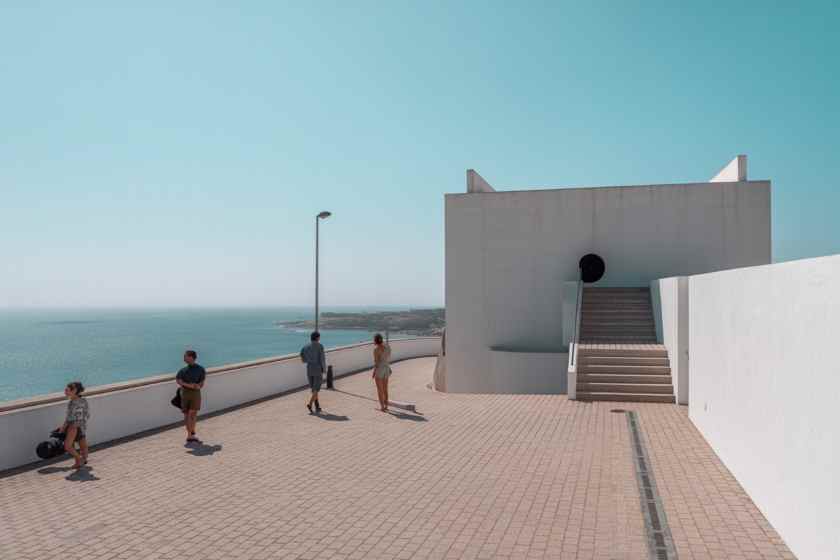Published on
September 29, 2025
Zer0 is a digital art museum which just opened in Tavira, Algarve, Portugal. It is housed in the former silos from the olive oil cooperative. The goal is to bring digital art to places that are not as culturally accessible. The museum uniquely focuses on supporting the creation of digital art. Southern Portugal has a new way to engage with art as the first digital art museum has just opened.
Not Your Average Digital Art Museum
With its focus on the creative process, the Zer0 Museum is the only digital ‘in situ’ museum of its kind. Unlike other museums that deal with antiquated collections, Zer0 offers something fresh for every visit. Its digital installations, multimedia projects, and rotating exhibitions of art change with time. New artistic residencies and more active experimentation by the artists encourage deeper and more innovative interactions with the audience, which greatly enriches the local region.
The museum is situated in the erstwhile agricultural cooperative, on the ground floor of its 7-story building. The museum complex’s ground floor has an immersive room devoid of windows, making it ideal for digital artworks. One piece is inspired by the Algarve’s Barrocal region and the other by the modernist architect Manuel Gomes da Costa, who designed the cooperative’s buildings in the 1950s. Other ground floor spaces include the ‘ero organ’ room filled with an antique organ and the multipurpose room that adapts to a range of activities and installations.
Artistic Creation and Experimentation
Located on the first floor, the Magalhães Space is a center for the construction and experimentation of digital artworks. This multisectoral initiative focuses on the Algarve, Alentejo, and Andalusia regions, constituting a transnational digital border for art creation. The facility includes a digital FabLab which has 3D printers, a sound studio, and all the other necessary instruments for the creation of digital artworks, 3D models, and sound.
The Zer0 Museum is a cultural center, and this is evident on the second floor where a courtyard is set up. Here, a variety of activities such as concerts, artistic digital performances, video mapping, videography, and cinema satellite streaming can be organized. The former silos of the Museum, located on the third floor, will be repurposed for the display of art projects, contributing to the unorthodox focus of the museum on contemporary digital experimental art.
Artist Residencies and Academic Collaboration
The Zeus Museum has allotted several rooms for the residencies of the artists in which they may engage in the activities of their works while remaining undisturbed. The residency spaces of the artists have been designed to serve diverse artistic functions and, as a result, to support multidisciplinary collaboration while maintaining the required boundaries.
In addition, the museum has created links with primary and secondary educational institutions, especially with the Univerity of Algarve. Located on the 6th floor, the Agora functions as an inter-university and collaborative forum for artwork project dialogues pertaining to research on digitized art and technologies.
In the context of the above, on the lower level of the museum, visitors from 10am – 6pm between Wednesdays and Sundays can access the museum for free, accessible to all, without legal restrictions. Relatively speaking, the acts of legal sponsorship and free entrance to the museum signifies the responsive… Relatively, it becomes apparent that legal sponsorship becomes responsive to citizens of the Algarve and even the globe.
The author describes the conditions of the new museum as an opening of the first of its kind in the Algarve region. Its digitalized format and the collaborative method of art widening its borders of the region and country will attract numerous lovers of art, as well as, tourists and scholarship students in the southern zone of Portugal.
Supporting Regional Tourism and Economic Development
The Zer0 Museum has the potential to engage with the surrounding region’s tourism and economic growth besides the cultural ramifications of such an endeavor. The museum’s approach to artistic digital work is particularly encouraging, and there is a wider sea of public engagement potential. The Zer0 Museum aims to create a blend of art, technology, and civic involvement, which reforms the existing notion of Tavira and the surrounding region’s status in Portugal to be a more central cultural area.
More so, the museum is an example of the successful integration of local heritage and global partnerships and the consequent economic growth of the local creative industry. The growth of cultural tourism in the region will hinge on Zer0 Museum’s success in bringing contemporary experiences that complement traditional attractions.
